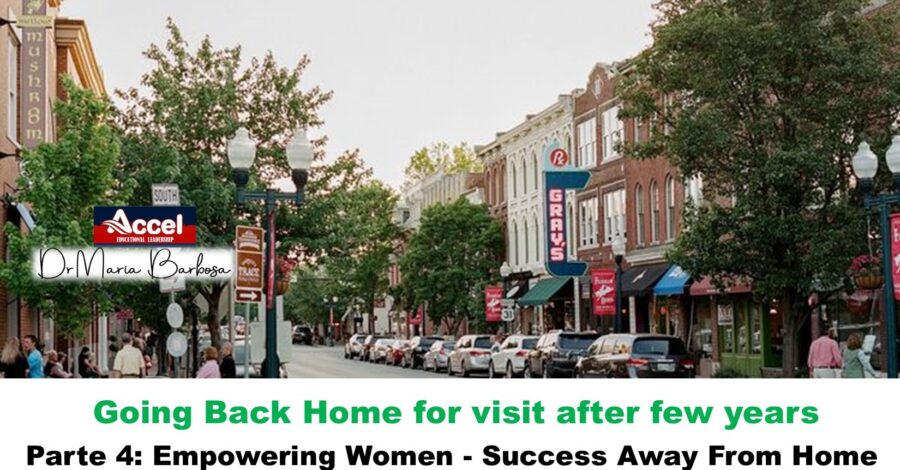Part 4 Empowering Women – Success Away From Home
Women’s Emotional Landscape When Revisiting Their Home State or Country
It’s not uncommon for women, especially immigrants, to experience feelings of not fitting in when they return to visit their siblings in their home country. This sense of not fitting can stem from the adoption of new habits and cultural norms in the country where they currently reside. These habits may differ from the social norms prevalent in their home country, leading to a sense of disconnection or unfamiliarity during visits.
Disconnection and Unfamiliarity: Visits to the home country can evoke a profound sense of disconnection and unfamiliarity. Women may find themselves navigating social situations with a heightened awareness of the disparities between their adopted cultural norms and those ingrained in their home country. This can lead to emotional turmoil, as individuals grapple with the tension between their evolved identity and the expectations of their cultural roots.
Simultaneously, immigrant women may also face similar feelings of not fitting in their current country of residence. This could be due to factors such as language barriers, cultural differences, a lack of familiarity with local customs, or even challenges related to appearance, skills, or accents. The process of adapting to a new culture can be complex, and individuals may grapple with a sense of not fully belonging or being accepted.
It’s important to recognize that these feelings are shared by many immigrants, and they are part of the adjustment process. Over time, individuals often find a balance between preserving elements of their original culture and integrating into the new one, leading to a more nuanced sense of identity and belonging. Building connections within the community, seeking support, and embracing the diversity of experiences can contribute to a greater sense of fitting in over time.
Coping Strategies
1. Embracing both cultural Identities: Recognizing and embracing both cultures identities stands as a potent coping strategy for women traversing the complexities of their emotional and often bewildering journey. Understanding that it is feasible to weave adopted habits seamlessly into one’s cultural identity fosters a more harmonious amalgamation of the past and the present. This coexistence of harmonious elements alleviates internal conflicts, nurturing a sense of unity within oneself. The acceptance of both identities will convey balanced emotional state.
2. Fostering Empathy: Communication serves as a conduit for empathy. By articulating the challenges and joys associated with adopting new habits, a woman invites her family and friends into her world. This shared understanding fosters empathy, transforming potential judgment into acceptance. Through open dialogue, emotional barriers are dismantled, paving the way for a more supportive environment.
3. Cultivating a Harmonious Balance- Emotional Resilience: The combination of embracing both identities and fostering open communication contributes to the development of emotional resilience. Women who navigate the clash between adopted habits and cultural roots with a sense of self-assurance and openness can better withstand external pressures. This emotional resilience allows for a harmonious balance, enabling individuals to navigate their home country visits with greater ease.
4. Positive Emotional Impact: The harmonious balance cultivated through these essential steps leads to a positive emotional impact. Instead of feeling overwhelmed or burdened by the clash of cultures, women can experience a sense of belonging and acceptance. This positive emotional shift not only influences their well-being but also enhances the quality of their interactions and relationships during visits to the home country.
Forgiveness and Reconciliation
- Self-Reflection: Begin by engaging in deep self-reflection. Identify personal feelings, motivations, and any unresolved issues that may be contributing to internal conflicts. This introspective step is crucial for understanding one’s own perspective.
- The Power of Forgiveness: The Bible teaches about the transformative power of forgiveness (Colossians 3:13). Embracing both identities requires forgiveness for perceived differences, allowing individuals to release negative emotions and move towards reconciliation. Through forgiveness, the emotional burden is lifted, paving the way for harmonious relationships.
- Acceptance: Acceptance plays a key role in reconciliation. Embrace your own strengths and weaknesses, acknowledging that imperfections are a part of being human. This self-acceptance lays the foundation for inner peace and healing.
- Reconciliation with Self and Others: The biblical narrative often speaks of reconciliation, both with God and others (2 Corinthians 5:18). Reconciliation is a process that takes time. Be patient with yourself and others involved. Healing may not happen overnight, but a consistent effort towards understanding and growth contributes to long-term reconciliation.
- Building Trust: Rebuilding trust is a crucial aspect of reconciliation. Consistently demonstrate reliability, honesty, and accountability to gradually rebuild trust with oneself and others.
- Patience: Reconciliation is a process that takes time. Be patient with yourself and others involved. Healing may not happen overnight, but a consistent effort towards understanding and growth contributes to long-term reconciliation.
The biblical perspective
While the Bible may not explicitly address the clash between adopted habits and cultural roots, several overarching principles can be applied to shed light on the importance of mitigating emotional turmoil and negative feelings in this context.
- Created in God’s Image: The biblical narrative emphasizes that all individuals are created in the image of God (Genesis 1:27). Embracing both cultures identities align with the acknowledgment that each person is fearfully and wonderfully made (Psalm 139:14). This recognition fosters an atmosphere of unity in diversity, where the coexistence of adopted habits and cultural roots is seen as a reflection of the richness of God’s creation.
- Love and Acceptance: Central to the biblical teachings is the commandment to love one another (John 13:34-35). By embracing other with love and acceptance, acknowledging the uniqueness of each individual’s journey. Through love, negative feelings can be replaced with a sense of belonging and understanding, promoting emotional healing.
- The Bible encourages truthfulness and transparency in communication (Ephesians 4:25). Fostering open communication aligns with the biblical values of honesty and openness. By sharing one’s experiences and struggles with family and friends, individuals create an environment where the truth can be spoken in love, fostering understanding and empathy.
- Building Bridges: Biblical teachings emphasize the importance of building bridges rather than walls (Ephesians 4:29). Open communication serves as a tool to build bridges between generations, cultures, and experiences. By breaking down communication barriers, individuals can cultivate relationships based on mutual respect and understanding, mitigating emotional turmoil.
Dr. Maria Barbosa is available to assist clients through counseling or mediation, offering valuable support. Seeking her professional guidance can provide effective tools for navigating complex emotions.
For scheduling an appointment, kindly text your details to WhatsApp at +1 386-206-6325. Thank you!
Discover more from Dr Maria Barbosa
Subscribe to get the latest posts sent to your email.





